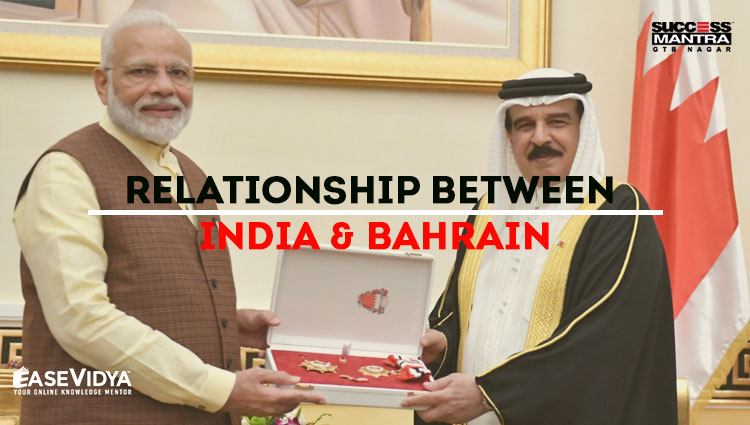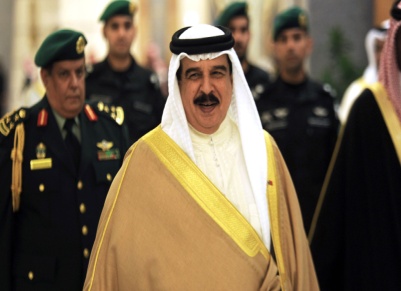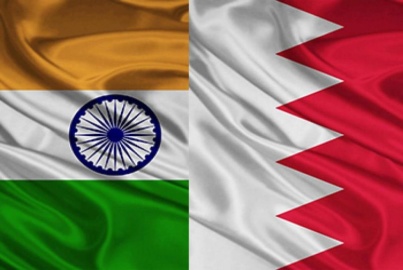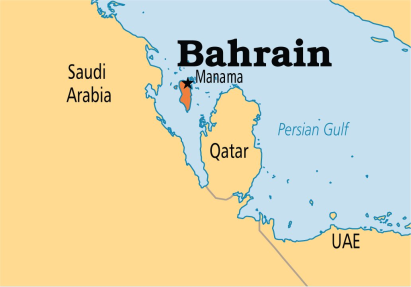
RELATIONSHIP BETWEEN INDIA & BAHRAIN
Relationship BETWEEN INDIA & BAHRAIN
In the recent Agreement between India & Bahrain the bilateral issues, as well as regional and global matters of mutual interest, included areas of defence and maritime security, space technology, trade and investment, infrastructure, IT, FinTech, health, hydrocarbon and renewable energy. Both sides affirmed to further strengthen their Covid-19 related cooperation.
SIGNIFICANCE & POLITICS OF BAHRAIN

• Bahrain's small size and central location among Persian Gulf countries require it to play a delicate balancing act in foreign affairs among its larger neighbors. Facing declining oil reserves, Bahrain has turned to petroleum processing and refining and has transformed itself into an international banking center. Sheikh Hamad Bin Isa Al Khalifa, who came to power in 1999, has pushed economic and political reforms and has worked to improve relations with the Shi'a community. In February 2001, Bahraini voters approved a referendum on the National Action Charter - the centerpiece of Sheikh Hamad's political liberalization program. In February 2002, Sheikh Hamad pronounced Bahrain a constitutional monarchy and changed his status from Amir to king. In October 2002, Bahrainis elected members of the lower house of Bahrain's reconstituted bicameral legislature, the National Assembly.
• Politics of Bahrain has since 2002 taken place in a framework of a constitutional monarchy where the government is appointed by the King of Bahrain, King Hamad bin Isa Al Khalifa. The head of the government since 1971 has been Prime Minister Prince Khalifa bin Salman Al Khalifa and the Crown Prince is Prince Salman bin Hamad Al Khalifa, who also serves as Deputy Commander of the Bahrain Defence Force. The parliament is a bi-cameral legislature, with the Council of Representatives elected by universal suffrage, and the Consultative Council (also called the Shura Council) appointed directly by the king.
KEY POINTS OF THE AGREEMENTS
• Bahrain appreciated the assistance provided by India during the pandemic through the supply of medicines, medical equipment and medical professionals. They expressed satisfaction on the operationalisation of the Air Bubble arrangement between the two countries. Air bubbles (travel corridors or travel bubbles) are systems established between two countries that perceive each other to be safe and allow carriers of both the countries to fly passengers either way without any restrictions. India renewed invitation to Bahrain for visiting India for the 3rd India-Bahrain High Joint Commission meeting to be held in the upcoming months.
• In 2019, India launched a USD 4.2 million redevelopment project of the Sri Krishna temple in the Bahraini capital, Manama. The 200-year old temple stands as a testimony for the enduring India-Bahrain friendship. India also conveyed condolences on the demise of late Prime Minister Prince Khalifa bin Salman Al Khalifa, who significantly contributed to the strengthening of India-Bahrain relations and to the welfare of the Indian community in Bahrain.
INDIA-BAHRAIN RELATIONS

• Bahrain–India relations are the political, socio-economic, military and cultural ties between India and Bahrain. India is a close ally of Bahrain. As per Indian officials, the Kingdom along with its GCC partners are amongst the world's most prominent supporters of India's candidacy for a permanent seat on the UN Security Council, and Bahraini officials have urged India to play a greater role in international affairs. For instance, over concerns about Iran's nuclear programme, Bahrain's Crown Prince requested India to play an active role in resolving the crisis.
• Indian Prime Minister Narendra Modi visited Bahrain on 24-25 August 2019, the first ever visit by an Indian Prime Minister to the country. India and Bahrain signed 3 MoUs on space, culture, the International Solar Alliance and the RuPay card. King of Bahrain Hamad bin Isa Al Khalifa awarded Modi with the Member 1st Class of the King Hamad Order of the Renaissance, the country's third highest civilian award, in recognition of his efforts to strengthen bilateral relations.
HISTORICAL TIES:
Their history goes back to about 5,000 years ago, to the period of Dilmun Civilization in Bahrain to the era of Indus valley civilization in India. Ancient Bahraini traders are believed to have carried out a flourishing trade of Bahraini pearls with Indian spices.
BILATERAL AGREEMENTS AND MOUs

Extradition Treaty (January 2004). MoU on cooperation in the field of Information and Communication Technology (May 2012). MoU on the establishment of a Joint High Commission (February 2014). MOU on Water Resources Development and Management (February 2015). Agreement on cooperation in combating international terrorism, transnational organised crime and trafficking in illicit drugs, narcotics and psychotropic substances and precursors chemicals (December 2015). MoU for cooperation in the fields of Renewable Energy and Healthcare and Agreement on Exemption from Short Stay Visa for Holders of Diplomatic and Special/Official Passport (July 2018). MoU on cooperation in the exploration and uses of Outer Space for Peaceful Purposes (March 2019)
TRADE AND ECONOMIC RELATIONS
Total bilateral trade stands at USD 1282.96 million in 2018-19 and USD 753.60 million in 2019-20 (April-Dec).
• Indian Exports to Bahrain: Mineral fuels and oils, inorganic chemicals, organic or inorganic compounds of precious metals of rare earth, cereals, nuts, fruits, articles of apparel and clothing accessories etc.
• Indian Imports from Bahrain: Crude oils, mineral fuels and their bituminous substance, distillation, aluminium, fertilizers, ores/slags/ashes of aluminium, iron and copper, pulp, etc.
• Indian investment in Bahrain: India’s total capital investment into Bahrain between January 2003 and March 2018 has been estimated at approximately USD 1.69 billion. Financial services have the highest investment value (40% of total projects), followed by the real estate and hospitality sector.
CONCLUSION
The Middle East has become more multipolar, with power diffused among a variety of regional and extra-regional actors. Within this mix, the rise of modern values and Khaleeji Capitalism in the gulf countries make the case for India to discard outdated perceptions of the Gulf and seize the new strategic possibilities with the region.
Approximately 3,50,000 Indians are living in Bahrain currently and around 70% are in the category of unskilled labour. In addition to the predominant blue-collar labour force, there is a sizable number of other professionals who play a vital role in Bahrain’s socio-economic development. In November 2015, Bahrain launched ‘Little India in Bahrain’ project to acknowledge and mark the contribution of the Indian community to the history and progress of Bahrain.
QUESTIONS (1-5)
Q.1 Back in 2002 which of the following Amir pronounced Bahrain a constitutional monarchy and changed his status from Amir to king?
A. Sheikh Hamad bin Hamdan Al Nahyan
B. Sheikh HAMAD bin Isa Al Khalifa: ANSWER
C. Sheikh Hamad bin Khalifa Al Thani
D. None of the above
Q.2 Which of the following country's PM visit is the first ever visit by an Indian Prime Minister to the nation of Bahrain?
A. Rajiv Gandhi
B. Atal Bihari Vajpayee
C. Manmohan Singh
D. Narendra Modi: ANSWER
Q.3 Gulf Cooperation Council (GCC) which is an political and economic alliance of six major Middle Eastern countries is headquartered at which of the following places?
A. Kuwait City, Kuwait
B. Manama, Bahrain
C. Riyadh, Saudi Arabia: ANSWER
D. Doha, Qatar
Q.4 Which of the following countries is not a member of Gulf Cooperation Council, an alliance of Middle Eastern countries?
A. Iran: ANSWER
B. Kuwait
C. Bahrain
D. Saudi Arabia
Q.5 Recently, Bahrain along with which of the following countries have Signed an historic Abraham Accord with India's Strategic partner Israel?
A. United Arab Emirates: ANSWER
B. Kuwait
C. Saudi Arabia
D. Iran













htlidkxzj
Latest News on Education & LAW Exams Blogs | Success Mantra <a href="http://www.g2pf3qpo7e4uwqc6j143d31z1s40g961s.org/">ahtlidkxzj</a> [url=http://www.g2pf3qpo7e4uwqc6j143d31z1s40g961s.org/]uhtlidkxzj[/url] htlidkxzj http://www.g2pf3qpo7e4uwqc6j143d31z1s40g961s.org/
drjyplvkm
Latest News on Education & LAW Exams Blogs | Success Mantra [url=http://www.gkk70k524932t6qys5whd1u1q143c6rms.org/]udrjyplvkm[/url] drjyplvkm http://www.gkk70k524932t6qys5whd1u1q143c6rms.org/ <a href="http://www.gkk70k524932t6qys5whd1u1q143c6rms.org/">adrjyplvkm</a>
ztzhctlq
Latest News on Education & LAW Exams Blogs | Success Mantra [url=http://www.g15s08kbd09qw3cu845f8aez96m1s71ys.org/]uztzhctlq[/url] <a href="http://www.g15s08kbd09qw3cu845f8aez96m1s71ys.org/">aztzhctlq</a> ztzhctlq http://www.g15s08kbd09qw3cu845f8aez96m1s71ys.org/
ikmggffvf
Latest News on Education & LAW Exams Blogs | Success Mantra ikmggffvf http://www.gc4t3p2334c5w1c0j2xr8gv7ye451oq4s.org/ [url=http://www.gc4t3p2334c5w1c0j2xr8gv7ye451oq4s.org/]uikmggffvf[/url] <a href="http://www.gc4t3p2334c5w1c0j2xr8gv7ye451oq4s.org/">aikmggffvf</a>